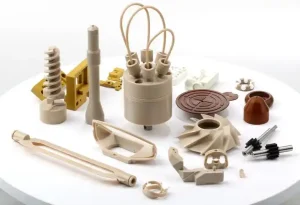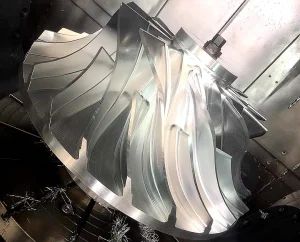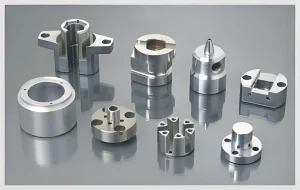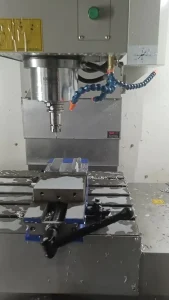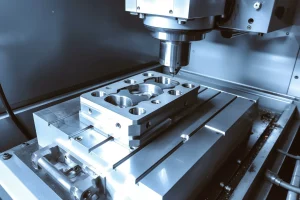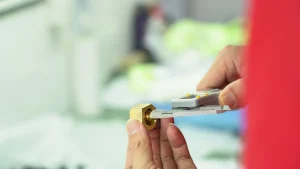Introduction
Medical titanium alloy parts processing holds significant importance in the medical field. Titanium alloys are renowned for their remarkable properties, including high strength, low density, excellent corrosion resistance, and outstanding biocompatibility. These characteristics make them ideal materials for manufacturing various medical devices, such as surgical instruments, implants, and prosthetics. In this article, we will explore the world of medical titanium alloy parts processing, including its techniques, challenges, and the role of Rapidefficient in the CNC machining market.
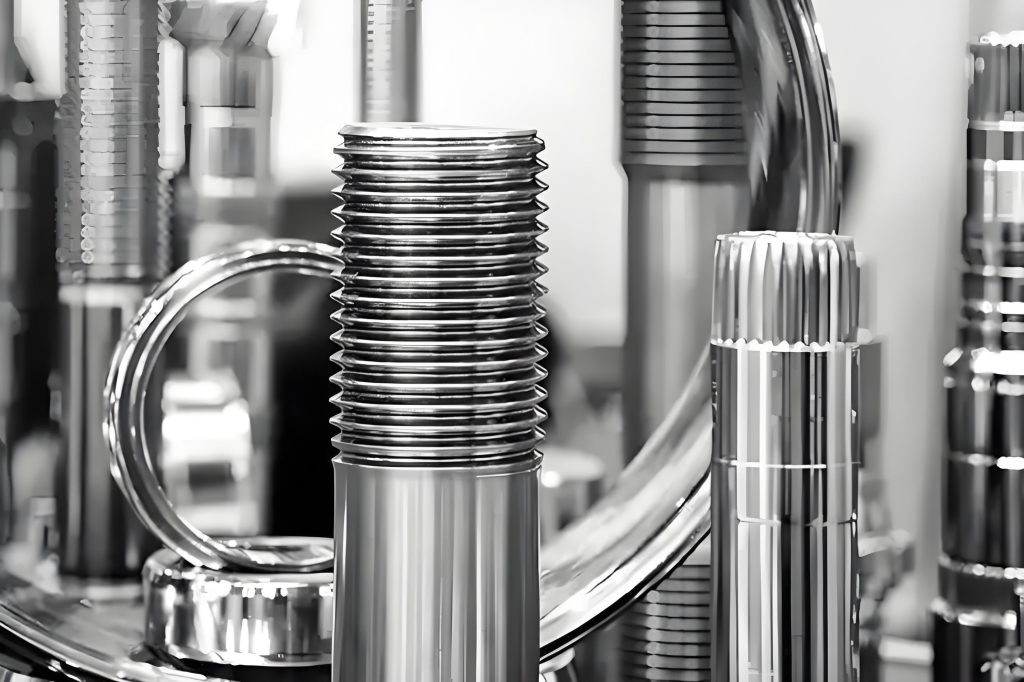
The Advantages of Medical Titanium Alloy Parts
Biocompatibility
One of the most remarkable features of medical titanium alloy parts is their excellent biocompatibility. Titanium alloys have a natural ability to integrate well with human tissues, making them highly suitable for use in medical implants. When implanted in the body, they do not trigger significant immune responses or cause adverse reactions. This is due to their chemical stability and the formation of a passive oxide layer on their surface. This layer helps prevent the release of metal ions into the surrounding tissues, reducing the risk of inflammation or allergic reactions. For example, in orthopedic implants such as hip and knee replacements, titanium alloy components can provide long – term support and stability while minimizing the body’s rejection response. This biocompatibility also extends to dental implants, where titanium alloys can bond with the jawbone, enabling the successful replacement of missing teeth.
Corrosion Resistance
The human body is a complex and corrosive environment, with various fluids and chemical reactions occurring constantly. Medical titanium alloy parts exhibit outstanding corrosion resistance in this environment. Titanium alloys form a highly stable and protective oxide film on their surface when exposed to oxygen. This oxide film acts as a barrier, preventing further oxidation and corrosion of the underlying metal. Even in the presence of bodily fluids such as blood, saliva, and interstitial fluid, which contain salts, acids, and other reactive substances, titanium alloys can maintain their integrity over long periods. For instance, in cardiovascular implants like stents, which are constantly in contact with blood, the corrosion resistance of titanium alloys ensures their long – term functionality. The ability to resist corrosion not only safeguards the structural integrity of the implant but also prevents the release of potentially harmful metal ions into the bloodstream, reducing the risk of systemic toxicity.
High Strength – to – Weight Ratio
Titanium alloys possess a high strength – to – weight ratio, which is crucial for medical applications. They are relatively lightweight compared to many other metals, yet they offer excellent strength and durability. This characteristic is beneficial in several medical devices. In orthopedic prosthetics, the high strength – to – weight ratio allows for the creation of lightweight yet sturdy implants. For example, a titanium alloy hip implant can support the body’s weight during various activities such as walking, running, and climbing, while being less cumbersome for the patient compared to heavier materials. In the design of surgical instruments, the use of titanium alloys can reduce the overall weight of the tools, making them more ergonomic for surgeons to handle. This can lead to increased precision and reduced fatigue during long surgical procedures. Additionally, in the development of medical equipment like portable diagnostic devices, the lightweight nature of titanium alloys makes them more convenient for transportation and use in different settings.
Challenges in Medical Titanium Alloy Parts Processing
Heat Dissipation
One of the primary challenges in medical titanium alloy parts processing is heat dissipation. Titanium alloys have a relatively low thermal conductivity. During machining processes such as cutting, milling, or drilling, a significant amount of heat is generated at the tool – workpiece interface. Due to the low thermal conductivity, this heat cannot be efficiently conducted away from the cutting zone. As a result, the temperature in the cutting area can rise rapidly. High temperatures can lead to several problems. Firstly, it can cause thermal expansion of the workpiece, leading to dimensional inaccuracies. In the case of precision – made medical parts, even a slight deviation from the required dimensions can render the part unusable. For example, in the manufacturing of dental implants, which need to fit precisely into the jawbone, any thermal – induced dimensional change can prevent proper integration. Secondly, the high temperature can also cause the softening of the titanium alloy in the cutting region, affecting its mechanical properties. This can potentially reduce the strength and durability of the final part, which is unacceptable for medical applications where long – term performance is crucial.
Tool Wear
Processing medical titanium alloy parts also demands special tools, and tool wear is a major concern. Titanium alloys are hard and abrasive materials. During machining, the tools are subjected to high stress and friction. The chemical reactivity of titanium alloys can also contribute to tool wear. Titanium has a tendency to react with the cutting tool materials at high temperatures, forming a diffusion layer that can cause the tool to degrade rapidly. Carbide tools, which are commonly used in machining, may not be sufficient for titanium alloy processing. Specialized tools, such as those made from cubic boron nitride (CBN) or diamond – coated tools, are often required. However, these tools are expensive, and their wear rate still needs to be carefully managed. The frequent replacement of worn – out tools not only increases the cost of production but also disrupts the manufacturing process. For instance, in the production of orthopedic implants, if the tool wears out during the machining of a complex – shaped component, it can lead to production delays and increased waste.
Material Reactivity
Titanium alloys are chemically reactive, especially at elevated temperatures. During machining, they can react with the surrounding environment, including the cutting fluid, the atmosphere, and the tool material. When titanium alloys react with oxygen in the air at high temperatures, they can form titanium oxides. These oxides can affect the surface finish of the part and may also alter its chemical and mechanical properties. Additionally, reactions with the cutting fluid can lead to the formation of unwanted compounds, which can contaminate the part. In medical applications, any form of contamination can be a serious issue as it can cause adverse reactions when the part is implanted in the body. For example, if a surgical implant has surface contaminants due to material reactivity during processing, it can increase the risk of infection or inflammation in the patient. Moreover, the reactivity of titanium alloys can also affect the stability of the machining process. Reactions between the workpiece and the tool can cause built – up edges on the tool, which can further affect the quality of the machined surface and increase tool wear.
Processing Techniques for Medical Titanium Alloy Parts
CNC Machining
Computer Numerical Control (CNC) machining is a widely used technique in the production of medical titanium alloy parts. It offers high precision and repeatability, which are essential for manufacturing medical components with tight tolerances. CNC machines are programmed to perform a series of machining operations, such as milling, turning, and drilling, with great accuracy. For example, in the production of orthopedic implants, CNC machining can create complex shapes and precise surface finishes. The use of advanced CNC technology allows for the efficient production of multiple parts with consistent quality. This not only improves the overall manufacturing process but also ensures that each medical titanium alloy part meets the strict standards required in the medical field. Rapidefficient, a leading provider in the CNC machining market, utilizes state – of – the – art CNC equipment to handle the processing of medical titanium alloy parts. Their expertise in programming and operating these machines enables them to achieve the high – precision requirements of medical component manufacturing, ensuring that the final products are of the highest quality.
Precision Casting
Precision casting is another important technique for processing medical titanium alloy parts, especially for components with complex geometries. In this process, a wax pattern is created to replicate the desired shape of the part. The wax pattern is then coated with a ceramic shell, and the wax is melted out, leaving a cavity. Molten titanium alloy is poured into this cavity and allowed to solidify. Once cooled, the ceramic shell is removed, revealing the finished part. Precision casting allows for the production of parts with intricate details and thin walls that would be difficult to achieve through other machining methods. For instance, in the manufacturing of some dental prosthetics or small surgical instruments, precision casting can create parts that closely match the anatomical requirements. This technique reduces the need for extensive post – processing and can significantly improve production efficiency.
Grinding and Polishing
After the initial shaping of medical titanium alloy parts through machining or casting, grinding and polishing are crucial steps to achieve the required surface quality. Grinding is used to remove any surface irregularities, such as rough edges or machining marks. It helps to improve the dimensional accuracy of the part and prepare the surface for polishing. Polishing, on the other hand, gives the part a smooth and shiny finish. In medical applications, a smooth surface is essential as it can reduce the risk of tissue irritation and improve the biocompatibility of the implant. For example, in the case of hip implants, a highly polished surface can reduce friction between the implant and the surrounding tissues, improving the patient’s comfort and the long – term performance of the implant. Specialized grinding and polishing tools and techniques are employed to ensure that the surface of the medical titanium alloy part meets the strict standards of the medical industry.
The Value of rapidefficient in the CNC Machining Market
High – speed Machining
Rapidefficient stands out in the CNC machining market for its high – speed machining capabilities. In the production of medical titanium alloy parts, time is often of the essence. High – speed machining allows for a significant reduction in production time without compromising on quality. With advanced spindle technology and high – speed feed systems, Rapidefficient’s CNC machines can achieve rapid material removal rates. This means that complex medical parts, such as those with intricate geometries for surgical instruments, can be machined much faster. For example, in the manufacturing of a titanium alloy dental drill bit, the high – speed machining provided by Rapidefficient can complete the shaping process in a fraction of the time compared to traditional machining methods. This not only improves the overall productivity of the manufacturing facility but also enables quicker delivery of medical products to the market, which is crucial for meeting the demands of the healthcare industry.
Precision Control
Precision is non – negotiable in the medical field, and Rapidefficient excels in precision control. Their CNC machines are equipped with state – of – the – art control systems that can achieve micron – level accuracy. When machining medical titanium alloy parts, such as orthopedic implants that need to fit precisely into the human body, even the slightest deviation can have serious consequences. Rapidefficient’s precision control ensures that every part is manufactured to the exact specifications. The advanced servo motors and high – resolution encoders in their machines work in tandem to provide accurate positioning and movement. This level of precision control not only guarantees the functionality of the medical parts but also enhances patient safety. For instance, in the production of hip implant components, the precise machining by Rapidefficient ensures a perfect fit, reducing the risk of implant failure and improving the long – term success of the surgical procedure.
Reliable Performance
Reliability is a key factor in the CNC machining of medical titanium alloy parts, and Rapidefficient’s equipment offers just that. The machines are built with high – quality components and undergo rigorous testing to ensure stable and consistent performance. In a production environment, any breakdown or malfunction can lead to costly delays and production losses. Rapidefficient’s reliable performance minimizes such risks. Their machines have a low failure rate, allowing for continuous production runs. This is especially important in the medical industry, where a steady supply of parts is essential. For example, in a medical device manufacturing plant that relies on Rapidefficient’s CNC machines to produce titanium alloy heart valve components, the reliable performance of the machines ensures that there are no disruptions in the production process, enabling the timely delivery of these critical components for use in life – saving medical procedures.
Conclusion
Medical titanium alloy parts processing is a critical and complex field. The unique properties of titanium alloys, such as biocompatibility, corrosion resistance, and high strength – to – weight ratio, make them indispensable in medical applications. However, challenges like heat dissipation, tool wear, and material reactivity need to be carefully addressed through advanced processing techniques.
Rapidefficient plays a crucial role in the CNC machining market for medical titanium alloy parts. Their high – speed machining, precision control, and reliable performance contribute to the efficient and high – quality production of these vital medical components. By choosing reliable CNC aluminum processing service providers like Company A, Company B, and Company C, medical device manufacturers can ensure the consistent supply of top – notch medical titanium alloy parts.
As technology continues to advance, we can expect further improvements in medical titanium alloy parts processing. New machining techniques, more durable tool materials, and enhanced control systems will likely emerge, leading to even better – quality medical products and ultimately improving patient care and outcomes.

